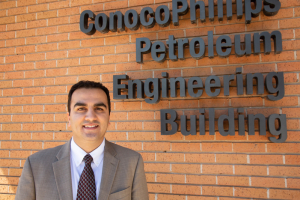Postdoc Research Focuses on Engineering in Unconventional Reservoirs
Ali Rezaei has the honor of being the first graduate of the Cullen College of Engineering’s doctoral program in petroleum engineering. He earned his Ph.D. this year by completing his dissertation on fast multipole fully-coupled poroelastic solutions of hydraulic fracturing.
“Rezaei is very dedicated to science and his dissertation is definitely one of the best dissertations I have seen,” said Mohamed Soliman, William C. Miller Chair of petroleum engineering. “We’re proud to have him as our first graduate.”
Launched in 2015 in response to the need for qualified engineers across all sectors of the energy industry, the petroleum engineering doctoral program now has 39 Ph.D. students. As a Carnegie-designated Tier One public research university in the Energy Capital of the World, UH is perfectly situated to provide a rigorous curriculum and cutting-edge research experience for its graduates, Soliman said.
“We expect to graduate between nine and 11 Ph.D. students during the 2018-2019 academic year,” Soliman said. “The high quality of Ph.D.s we’re producing should reflect well on our ranking.”
Rezaei is continuing with UH as a postdoctoral researcher with Birol Dindoruk, professor of petroleum engineering and a member of the National Academy of Engineering (NAE).
“Everybody in the petroleum industry is trying to expand on some aspect of working with unconventional reservoirs, such as shale plays,” Rezaei said, adding that unconventionals offer great potential in terms of oil and gas extraction in the U.S. and are projected to reach unprecedented levels of output over the next decade.
The unique nature of these reservoirs require complex extraction methods and hydraulic fracturing is key to producing oil in such situations, he said.
He will continue his research – started during his doctoral work – to understand the behavior and impact of hydraulic fracturing in unconventional reservoirs. And he is proud of his new title.
“I’m honored to be the first one,” Rezaei said. “My Ph.D. was a necessary step in preparation for more ambitious research.”
He earned his master’s in petroleum engineering from Texas Tech University and his bachelor’s in petroleum engineering from Azad University in Iran.
